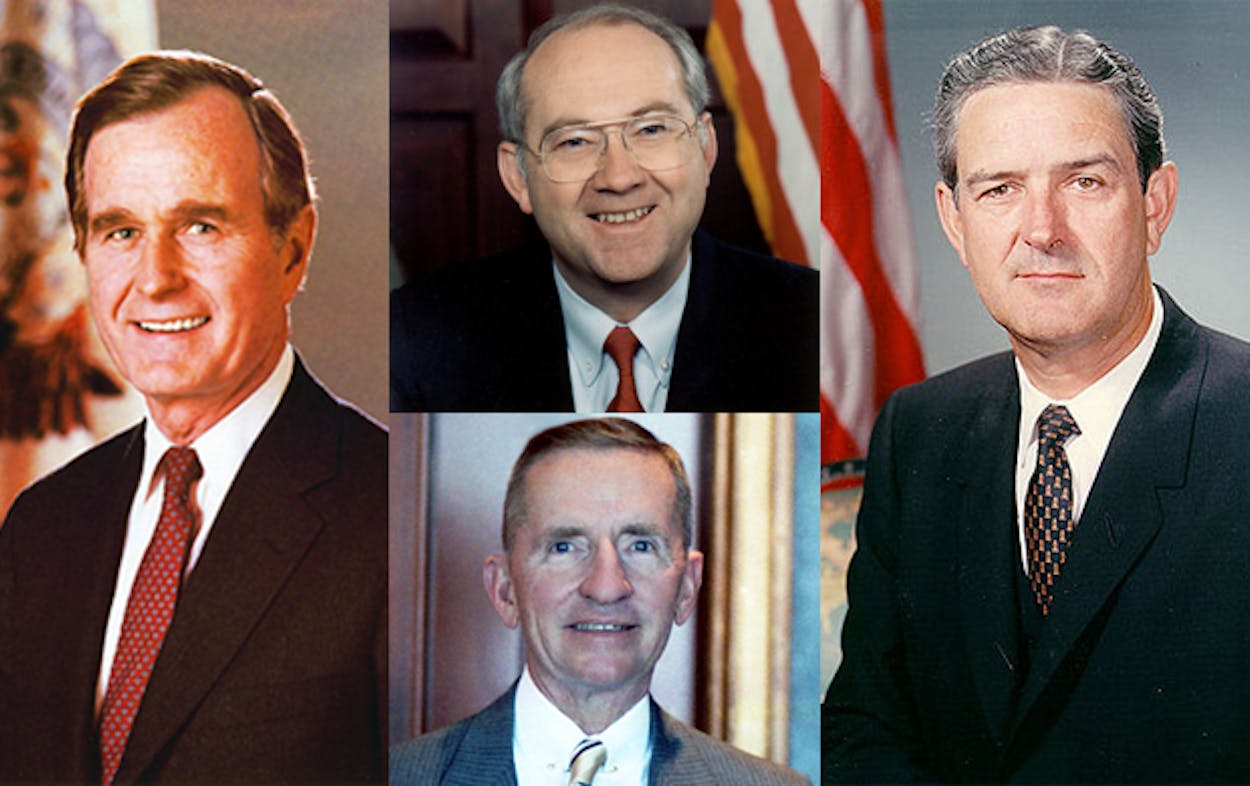Rick Perry’s gave his 1,291-word concession speech Thursday in a “tiny, overstuffed and overheated” room in a Hyatt near the Charleston airport.
“I’ve always believed the mission is greater than the man. As I’ve contemplated the future of this campaign, I’ve come to the conclusion there is no viable path forward for me,” Perry said in his eleven-minute concession speech. He continued:
So now the journey leads us back to Texas, neither discouraged nor disenchanted, but instead rewarded for the experience and resolute to remain in the arena and in the service of a great nation.
How have other Texans who mounted unsuccessful presidential bids made their exits?
Phil Gramm — February 14, 1996
After a poor showing in the Louisiana and Iowa caucuses, Senator Phil Gramm dropped his Republican primary bid, delivering a speech to a room full of supporters on Capitol Hill:
I am today ending my campaign for president of the United States. When the voters speak, I listen, especially when the voters are saying someone else’s name.
Getting out of this race is not an easy thing for me, but I decided that it would be it would be unfair of me to stay in the race, when it is clear I am not going to win. And when it is time for our party to make a choice and to choose someone else
At the time, CNN said Gramm “like many presidential candidates before him . . . looked better ending his campaign than he did during much of it.”
George H.W. Bush Concedes to Bill Clinton — November 3, 1992
Some 25 minutes after CNN declared Bill Clinton the winner of the 1992 presidential race, George H.W. Bush arrived in the ballroom of Houston’s Westin Hotel and delivered his concession speech, keeping his remarks under 700 words:
I just called Governor Clinton over in Little Rock and offered my congratulations. He did run a strong campaign. I wish him well in the White House, and I want the country to know that our entire administration will work closely with his team to ensure the smooth transition of power. There is important work to be done, and America must always come first, so we will get behind this new president and wish him–wish him well.
And for all who voted for us, voted for me, here–especially here–but all across the country, thank you for your support. We have fought a good fight and we’ve kept the faith and I believe I have upheld the honor of the presidency of the United States. Now, I ask that we stand behind our new president and regardless of our differences, all Americans share the same purpose to make this, the world’s greatest nation, more safe and more secure and to guarantee every American a shot at the American dream.
Bush said he would try to find ways to continue serving people, but he also planned “to get very active in the grandchild business.” Time magazine noted that Bush’s concession speech was “uncomfortable and fraught with freudian slips” This led William F. Buckley Jr. to describe the speech as “sad — grotesque, even” in the National Review.
Ross Perot — November 3, 1992
After becoming the most successful third party candidate for president in American History with 18.9 percent of the vote, Ross Perot conceded to supporters gathered at the Grand Kempinski Hotel in Dallas in a speech almost double the length of Bush’s:
As long as I live, one of the happiest memories of my life will be the memory of working with you. That memory will never dim. It’s the nicest honor I will ever receive in my life . . . Spend about 10 minutes getting over being frustrated that your candidate didn’t win. Then take all this enormous creativity and talent that you have displayed and let’s make our country work at the national, state, county, city, and local neighborhood level and at every single school across the country.
This is no time to get discouraged. This is no time to throw in the towel. This is the time to redouble our efforts and work with the new administration to make sure that our country is a beacon to the rest of the world.
John Connally — March 9, 1980
After Ronald Reagan delivered John Connally a resounding defeat in the South Carolina Republican primary, the former Texas governor dropped out of the race, announcing his decision to hundreds of his supporters gathered in a Houston ballroom:
We finished second and . . . and not a very close second I might add and so for all intents and purposes based on the victories that he continues to pile up, Governor Reagan is still the champ. And we haven’t overtaken him and I don’t think we’re going to overtake him and I don’t at this point see that, that my future continuation as a candidate for the Republican nomination contributes to the good of the Party or the good of the country. Today I’m announcing my withdrawal as a can . . . of my candidacy.
Sixteen days later, Connally appeared arm in arm with Reagan at the Dallas-Fort Worth Regional Airport and gave him his endorsement.







